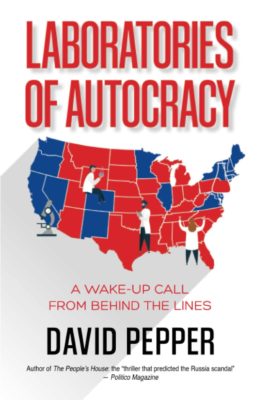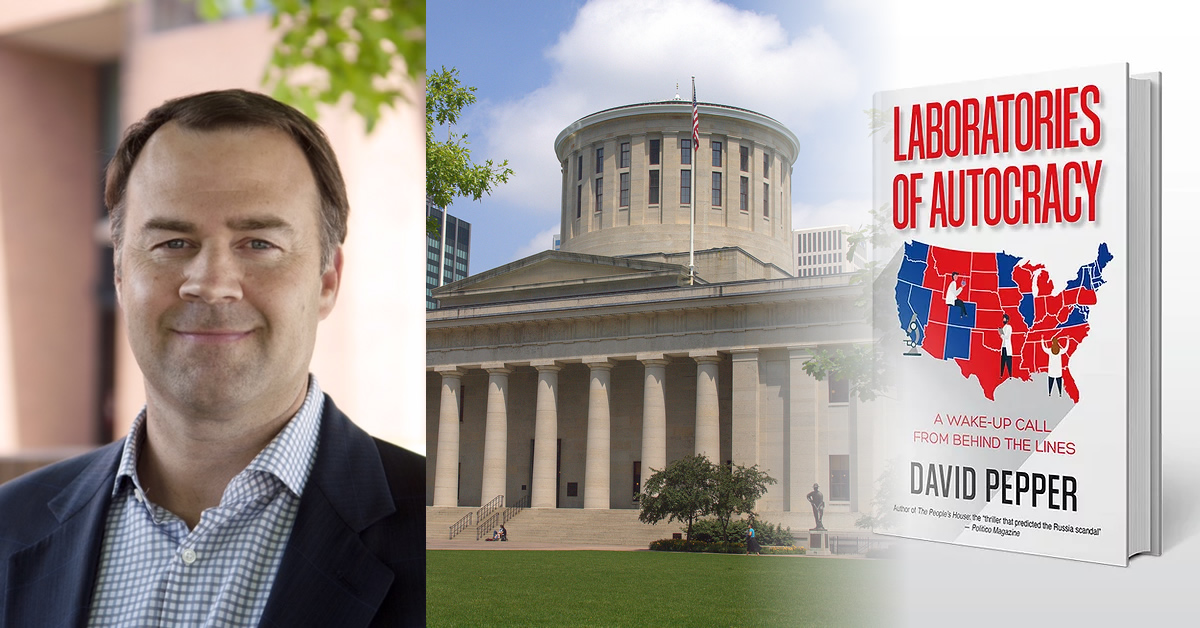While governors, mayors, and other local leaders are somewhat well known, fewer people can name a single member of their state legislature.
Statehouses are getting less attention and mass media coverage than in decades past, yet most non-federal legislative authority in the United States is concentrated and exercised at the state level, as opposed to the local level.
In Laboratories of Autocracy, David Pepper argues that state legislative bodies under right wing control use this sad state of affairs to work clandestinely behind the scenes, undermining elections at every level and U.S. democracy as a whole.

In the book’s initial chapters, using Ohio as a case study, Pepper explains how gerrymandering in 2010 has fueled a decade of corruption and rigged elections. Although these passages are largely focused on Ohio, the issues discussed aren’t unique to the Buckeye State, and affect many other states.
The small size of most House and Senate districts, along with constraints on the amount of time that many legislatures can be in session, exacerbate the problems resulting from the demise of countless local media outlets that used to cover legislative proceedings. Without locally-focused reporters keeping a watch on statehouses, it’s harder for the public to track the proceedings and the players.
Before addressing the negative outcomes of gerrymandering in the 2020 presidential election, Pepper discusses the ramifications of Republican-controlled legislatures enacting extremely unpopular legislation drafted by powerful, private interests, including corporate lobbying groups. Pepper explains that in Ohio, Republican legislators were able to partner with lobby groups and private companies to profit off of state funding for schools and prisons.
One of the most prominent groups driving state legislation in Republican run states is ALEC. Effectively privatizing the legislative process, ALEC members draft legislation that gets opaquely rammed through by Republican legislators.
Pepper does an excellent job in these chapters of reestablishing his premise and adding context to his previous commentary. The book cites many examples and figures that could easily blend together as the book goes on, but by highlighting the main points of each chapter and referring back to them frequently, Pepper does his best to ensure that readers don’t get confused.
Pepper reminds readers at multiple junctures that these problems aren’t unique to Ohio. Following the 2008 election, Republicans across the country began a clear and full assault on several groups: young voters, Black voters, and early voters.
These passages will likely resonate powerfully with any reader who has been following the public attacks on voting rights following the 2020 election.
Pepper provides specific details and context to show that attacks on voting rights have been happening behind the scenes for a much longer period of time.
Pepper specifically addresses Section 5 of the Voting Rights Act and how this provision could have stopped many pieces of legislation Republicans have been trying to enact. Citing the book’s earlier chapters, Pepper reminds readers that these bills are highly unpopular among members of both parties in their districts. Unfortunately, Republican legislators know that most of them will face no electoral consequences for sabotaging voting rights in their highly gerrymandered districts.
Looking ahead, Pepper discusses the threat this poses to the integrity of the 2022 and 2024 elections. At Donald Trump’s urging, many Republican state legislators did whatever they could to overturn the results, joining in on Trump’s attack on American democracy, including trying to legitimize fake sets of electors.
Pepper argues that with four years to prepare, these Republican legislators may be able to do in 2022 and 2024 what they could not do in 2020.
In the final chapter of the book’s second section, Pepper compares voter suppression in recent years to the end of Reconstruction and the beginning of the Jim Crow era. As Pepper notes, backlashes to civil and voting rights advancements for Black Americans have historically been devastating.
In this chapter, David Pepper examines what could have been done to stop the destructive effects of these regressive laws. He urges all who care about democracy to respond forcefully. “If you let up, or divide, the united and dedicated forces of Jim Crow will move in immediately. They will take over.”
The concluding chapters offer a detailed plan to pass robust laws protecting voting rights, strongly defend these precedents through federal enforcement, and challenge any laws designed to attack these protections.
Laboratories of Autocracy offers an excellent overview of the struggle to defend and expand voting rights. Although some of the early chapters were a little redundant and Ohio-centric, this is nevertheless a very readable book that it is at times astonishing and at other times sobering. It was hard to put down.
Reading this book, I felt like I was getting insider information from a state lawmaker about what is really going on behind the scenes.
The author is clearly dedicated to grassroots work in his home state, writing with sincere conviction and passion.
With district lines being redrawn and with fierce legal fights over new maps playing out in a host of swing states as the midterm elections approach, this book provides an excellent discussion of how we got here and what we can collectively do to turn away from the path towards autocracy. If we want to ensure that decisions in this country are made by the many instead of by a few, we simply must be aware of and responsive to what is happening in our statehouses.

